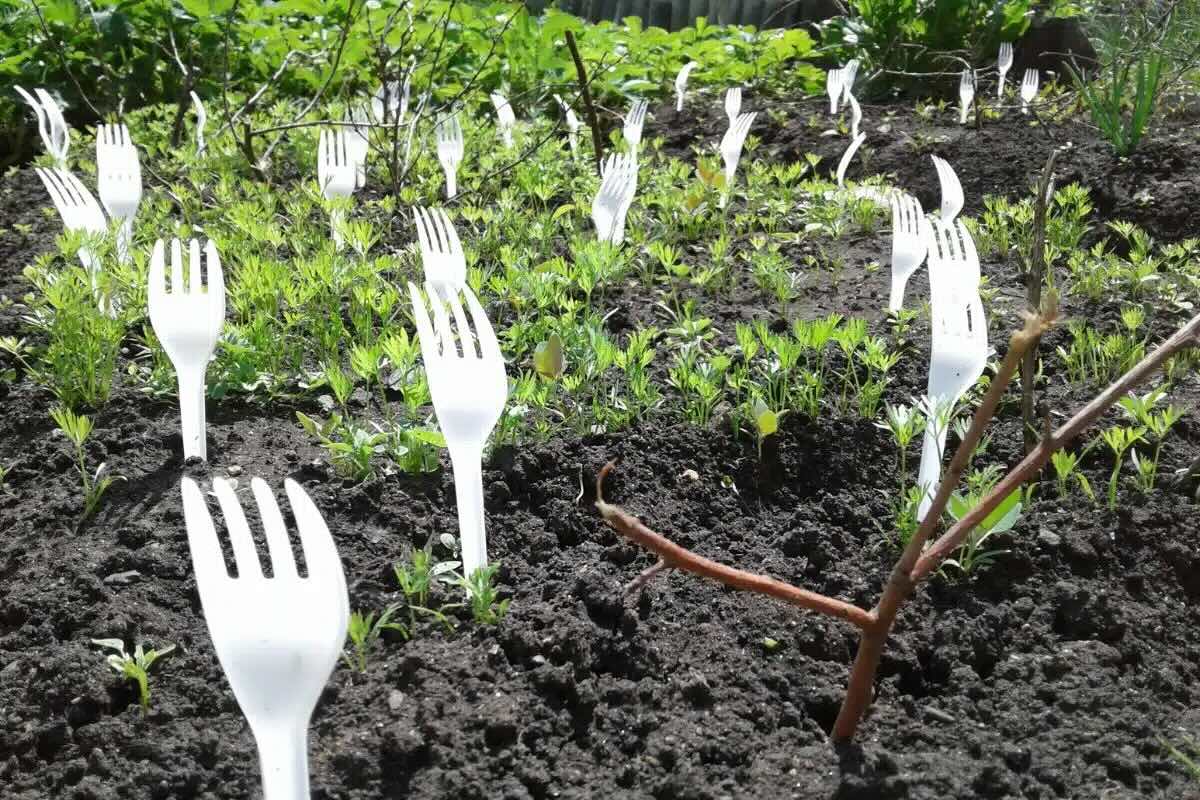Anyone who spends time caring for a vegetable patch knows the disappointment of seeing plants damaged by pests. Cats, squirrels, and even deer can undo weeks of effort in just a few minutes. While many gardeners turn to fences, sprays, or other costly solutions, there is a surprisingly simple method gaining attention: placing plastic forks in the soil around your plants.
It may sound unusual at first, but this low-cost trick can create an effective barrier against curious animals without using chemicals or heavy equipment.
How Plastic Forks Deter Animals
The idea is simple. By sticking forks into the ground with the prongs facing upward, you make the space less comfortable for animals to walk or land on. Cats and squirrels, for example, are quick to avoid areas where they cannot move freely. The forks disrupt their usual patterns, discouraging them from entering the garden.
Although the method has not been scientifically proven, many gardeners report that it noticeably reduces visits from animals. It works as both a visual deterrent and a physical barrier, making it harder for pests to approach young plants or dig in the soil.
The Extra Advantages of Reusing Forks
Using forks in the garden is not only about protecting plants. It also provides other benefits. Old or unused forks can be repurposed instead of being thrown away, reducing plastic waste. Unlike permanent fencing, the forks can easily be rearranged or removed as your garden grows. This flexibility makes the solution both temporary and adaptable.
For those on a budget, it is also an economical choice. Instead of investing in expensive barriers or pest control systems, gardeners can reuse simple household items to achieve similar results.
Eco-Friendly Gardening with Simple Tricks
In today’s world, finding sustainable ways to reduce waste matters. Reusing plastic forks gives them a second purpose while helping to keep your crops safe. Of course, moderation is important. It is best to use this method thoughtfully and combine it with other natural solutions to maintain a healthy balance in the garden.
Cayenne pepper is one such option. Sprinkling small amounts around the base of plants creates a smell and taste that animals dislike, keeping them at a distance. Bay leaves are another natural repellent, as their strong scent can help deter unwanted visitors. Essential oils such as peppermint or eucalyptus are also sometimes used by gardeners looking for chemical-free alternatives.
A Simple Way to Protect Your Plants
Gardening is most rewarding when your plants are able to grow without interference. While fences and sprays can work, sometimes the simplest ideas make the biggest difference. A handful of plastic forks arranged in your vegetable bed can discourage animals, protect crops, and even give new purpose to materials that would otherwise be discarded.
Combined with natural repellents like cayenne pepper or bay leaves, this little trick can help you enjoy a healthier, more sustainable garden. Protecting your plants does not always require expensive solutions—sometimes it just takes a clever idea and a few everyday items.

Woot micro plastics. Screw the environment whatever makes your life the easiest is what matters. Imagine being smart enough to place those crappy mouth drying wood forks. (Remember when we went paperless to save trees…….)now that some thoughtful thinking.
Beautiful tips 👌
Please write to me so I can write back
We like the eco friendly approach methods…